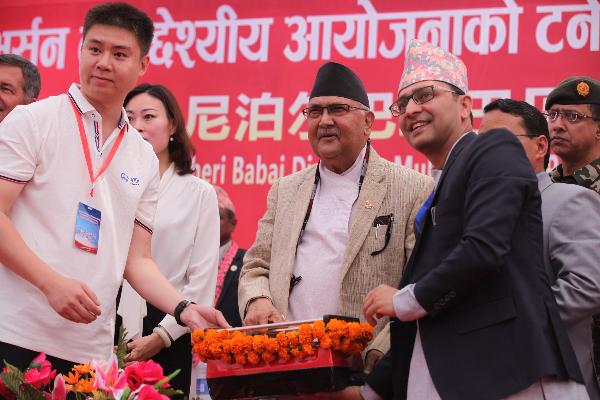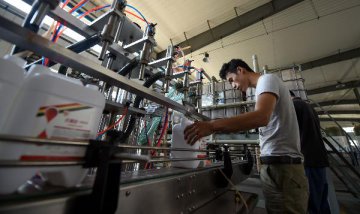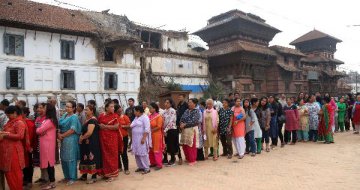
Nepalese Prime Minister KP Sharma Oli (C) attends the ceremony celebrating the breakthrough of the 12.2 km tunnel of Bheri Babai Diversion Multipurpose Project (BBDMP) in Surkhet district of Karnali Province in western Nepal, on April 16, 2019. Celebrating the breakthrough of a national project constructed by China, Nepali leaders and officials said here Tuesday that the project has supported the country's determination to realize its national dream "Prosperous Nepal and Happy Nepali." As the first of its kind of inter-basin water transfer project, the main part of Bheri Babai Diversion Multipurpose Project (BBDMP) has been completed almost one year earlier than its original duration. (Xinhua/Zhou Shengping)
SURKHET, Nepal, April 16 (Xinhua) -- Celebrating the breakthrough of a national project constructed by China, Nepali leaders and officials said here Tuesday that the project has supported the country's determination to realize its national dream "Prosperous Nepal and Happy Nepali."
As the first of its kind of inter-basin water transfer project, the main part of Bheri Babai Diversion Multipurpose Project (BBDMP) has been completed almost one year earlier than its original duration. The 12.2 km tunnel on the bank of Bheri River, which is famous for its resourceful water, is located in Surkhet district of Karnali Province in western Nepal.
Prime Minister KP Sharma Oli said at a ceremony attended by Chinese ambassador to Nepal Hou Yanqi and U.S. ambassador Randy Berry that "Nepal is now ready to walk and work together with the international community towards the new direction of development."
Expressing gratitude to the Chinese contractor for the successful completion of the project despite of geographical challenges, Oli shared that Nepal welcomes the use of new technology in other multipurpose projects as well.
According to the Chinese ambassador, the success of the project is a result of international cooperation, characterized by the Tunnel Boring Machine (TBM) manufactured by America and the design and construction completed by Chinese contractor, China Overseas Engineering Group Co. Ltd.
Through a 12.2 Km long tunnel constructed by TBM technology, the first practice in one of the least developed countries, this 107 million U.S. dollar project will provide irrigation facility to 51,000 hectares of land in Banke and Bardiya districts.
Minister for Energy, Water Resources and Irrigation Barsha Man Pun termed the use of this globally advanced technology as a historical revolution for the tunnel construction.
"The project has boosted the confidence of our government to expand this technology in other multipurpose projects for the speedy completion," Pun told around 2,000 participants, requesting the development partners to provide technical and financial assistance.
The irrigation-cum-hydroelectric project is one of the strategic projects of the country that is in dire need to ease the food crisis in the region by increasing agricultural yield.
Mahnedra Bahadur Shahi, Chief Minister of Karnali Province expressed that this province enriched with many natural resources, is hopeful to resolve both the food insecurity and poverty, alarming issues with the full completion of the multipurpose project which includes a 48 MW hydro power plant that is supposed to be built in the second phase.
Speakers of the program highly praised the Chinese contractor as the project, which was inaugurated in 2015, has been able to be done one year before the deadline.
Sanjeeb Baral, project director from Nepal side, said that the early success has opened a new dimension for other development projects despite of fragile geography.
According to the project's supervision contractor based in Italy, the dedication of the Chinese contractor, besides the TBM technology, is the major reason behind the successful story.
"It is the good attitude and willingness of the Chinese company, which made the project complete early," Arun Sharma, a Nepali engineering consultant serving the Italian company, told Xinhua on the spot.























Latest comments